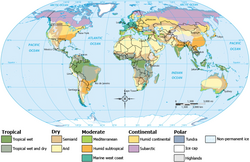Appropriate health care manual refers to a manual regarding health care which is designed with special consideration to the environmental, ethical, cultural, social and economical aspects of the community it is intended for. In practice, appropiate health care can be set up using a mix of [1], vaccination, phytotherapy and surgery. Phytotherapy can be used to treat smaller health problems and common diseases, while surgery can be used to treat serious injuries.
Set up
Before being able to determine the cause of the disease or malady, accurate diagnosis is required. This may be done manually (through observation, inquiries) and by specialised tools. For this, villagers can be trained and can then monitor other villagers for maladies. Trained villagers have shown to be able to eliminate 80% of the health problems in other projects. Small (low-cost) hospitals - based on the model of the Jamkhed hospital – can remedy another 15%, while only 5% will need to go to a larger (more expensive) hospitals.
Isolation
The best method to stay healthy is simply to avoid any possible contact with pathogens. Besides having set up the regular sanitation systems, ... mentioned in the Appropriate living manual, we also take additional precautions. These precautions include reduce interaction with anyone that has gotten a malady, ...
Vaccination
Vaccination is another important issue in appropriate health care. In any case, the vaccins for general diseases as Hepatitis A, Hepatitis B, Yellow fever, Dengue, Malaria (not yet out but soon), ...
Phytotherapy

Herbalist medicines can be taken as tinctures, tisanes, decoctions, ... . They can be freely made at home and are almost as effective as their chemical counterparts. A previous program that made use of herbal medicine was the Barefoot doctor program.
The exact medicinal herb best used, depends on the location on earth. The herb needs to be chosen based on the Köppen climate.
Surgery
Surgery can be performed in small (low-cost) hospitals based on the model of the Jamkhed hospital.
Advantages
Compared to the use of professionally schooled doctors, this set-up is far less costly and has proven to be most appropriate.[1] Also, in the developing world, most doctors tend to leave to first world countries, thus meaning that in most developing countries, no doctors are still present; hereby making the hiring of alternative employees a more suitable option.
Also, as a great deal of medicine can be simply extracted from herbs, there is a great ecological advantage aswell, as no chemcial drugs no longer need to be made.